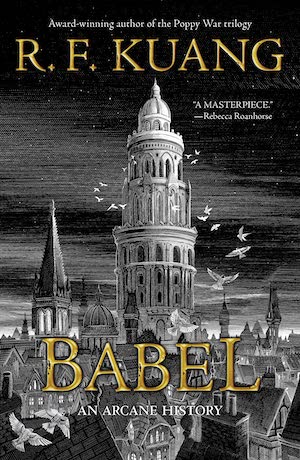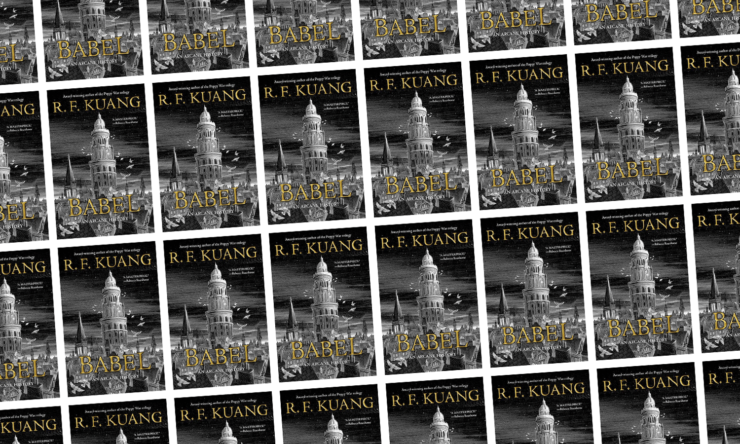It’s rare that a book title so perfectly communicates the breadth of its story at a glance. But when R.F. Kuang’s book deal was first announced in 2021, how could we not spend the intervening year eagerly waiting to crack the spine on Babel: Or the Necessity of Violence: An Arcane History of the Oxford Translators’ Revolution? It tells us everything to expect tonally but also nothing of the emotional journey that will take place in this alternate-history fantasy doorstopper.
This is a scrupulously researched, ruthlessly cutting rejoinder to books like Donna Tartt’s The Secret History, except that the murder around which this cohort of students is bound in blood is the attempted fall of colonialism. (Well, and also a literal murder. Several, really. It’s a very bloody book.)
In this version of the 1830s, everything runs on silver, with magical match-pairs of translated words providing creature comforts, propping up cities and empires, and both saving and taking lives. Robin Swift, whisked away from Canton at a young age and molded through English society and classical language study, joins Oxford University’s Royal Institute of Translation, a.k.a. Babel. But even as Robin falls hard for the magic of finding the perfect word and for the magic of camaraderie with his dear fellow translators, he cannot ignore Britain’s grasping reach across the world—nor his role in such expansion when it greedily grabs for China. Babel makes its characters and its readers fall in love with an institution, then breaks their hearts with the harsh but necessary truth that the institution will never love them back in the way that they need.
Buy the Book


Babel: Or the Necessity of Violence: An Arcane History of the Oxford Translators’ Revolution
In the first of its five books, Babel establishes the familiar rhythms of both adventure and academic tales: Robin is rescued from a cholera outbreak, thanks to a silver bar and a baffling translation that saves his life but is just too late to save his mother. Wielding that bar is Richard Lovell, a professor from Babel who becomes Robin’s guardian and carries him away to England before the boy can even register that he is leaving his homeland behind forever. Renamed with a more palatable English moniker, Robin gets the illusion of control in choosing his own surname: Swift, after his beloved Gulliver’s Travels. What follows are years of intensive study of Latin and Greek as well as keeping up his Mandarin, until he is shuffled over to Oxford to join the ranks of the reclusive, eccentric, erudite translators-in-training known as the Babblers.
Kuang shrewdly draws in the reader in the same way that Robin and his fellow students are enticed, with the romance of the dark academia aesthetic: Oxford’s Gothic architecture, with buildings that appear (or magically are) bigger on the inside. An instant-best-friends cohort in Ramy (born in Calcutta, raised in Britain), Victoire (born in Haiti, raised in France), and Letty (born and raised in England, the token white girl). Late-night translation sessions verging on the hysterical, hovering right at the point of breakthrough. Lemon biscuits from the buttery as sustenance. Formal balls and faculty parties. Blood wards attacking anyone who tries to leave Babel carrying its secrets. A secret society made up of Babel dropouts who recruit Robin to help level the silver-magic playing field.
Because even as the book falls into the familiar rhythms of the academic school year, discordant notes sound to make clear how flawed the system is even at this remote institution. Robin, Ramy, and Victoire experience casual racism and microaggressions even in spaces in which they supposedly belong; the double-edged sword of acting as model minorities further alienates them from their homelands, while never quite convincing their white peers that they deserve their spots. Oxford’s cozy embrace is stifling when the students come to recognize that their perceived security comes from invisible scouts who make their beds, from stipends briskly handed over without any education on how money actually works—all perks intended to encourage Babel’s assets to bend their heads over their translations and block out the outside world with its conflicts and inequalities, all in favor of brainstorming more and more silver match-pairs to keep the wheels of progress turning.
And it is such a compelling magic system, built on the utterly nerdy delight in how these scholars cannot perform any actions without first reading: perusing endless texts in breathless search of the perfect clever etymology that no one else has ever thought of. But the dark side of that is that all it takes is finding the perfect match-pair to wreak incredible violence; and that once they put those words out into the world, they cannot ever take them back.
Kuang interrogates why these tropes make readers and feel so cosseted, and reveals the ugliness beneath: Though many a fantasy professor demands far too much from his “chosen one” while providing little context, Professor Lovell’s long game in plucking Robin out of obscurity is horrifying and dehumanizing on a gut-wrenching level. And not even Robin’s cohort is innocent nor indestructible; petty jealousies and chasms of lived experience erode their bonds of friendship to the point where it becomes clear that there is no turning back. (Though there was a gasp-out-loud moment where I found myself assuming that Robin would figure out some cunning translation to transform a silver bar into a time-turner. But alas, this is not that sort of fantasy world.)
Once Babel picks up speed, it’s a delirious race to an ending that is both stunning and not surprising. It’s in the name, after all: Oxford’s Babel christened itself after a mythical tower whose legacy lies not in its construction but in its self-destruction. (Though even using self is inaccurate, as it took divine intervention to break up that experiment into its disparate, chaotic building blocks.) Kuang makes you want so badly for Babel to succeed, especially where its Biblical namesake could not.
The book is filled with such precise details, like how the Babblers’ rebellion takes place just a few years after the events of Les Misérables—not Victor Hugo’s novel, which won’t be published until 1862, but the 1832 June Rebellion that has occurred just a few years before Robin’s uprising. Historical context like this really emphasizes the sense of existing within a story, and the self-consciousness of living through history. (Frequent footnotes clearly written in a different voice than the main narration add engaging texture to the story, though one might want that voice to be even more distinctive and/or opinionated.)
As almost an avatar for Babel itself, Robin is one of the most honestly flawed characters to appear in SFF in some time. Yes, he’s brilliant and he loves fiercely, but he is also constantly tormented by his inability to exist in multiple worlds—cultural, fictional, historical—and under nigh-impossible expectations. His shame at initially wanting to keep his head down and thrive at Babel without thinking about its impact on the larger world is balanced by his shame at not living up to the tropes of an adventure tale. Of the quartet, he is the most likely to run, or to break under pressure, yet also the most capable of committing unspeakable violence when he believes in its justification. Robin’s struggles to justify his survival, starting with his second chance at life, are wrenching. As he finally decides on his place within the larger narrative, it will be both what you didn’t want for him and the only thing that makes sense.
Just because an experiment is unsuccessful doesn’t mean that it didn’t matter. In fact, perhaps that makes it all the more vital to history. Even a translation that was “wrong” or didn’t elicit the desired result is not a failure. Someone still took the risk of putting the words out there and tried to make a connection; they spoke with the hope that someone would listen. R.F. Kuang has achieved the paradox of depicting the collapse of Babel within the triumph of Babel.
Babel is published by Harper Voyager.
Natalie Zutter recommends you read Elena Fernández Collins’ insightful (and spoilery!) Twitter thread on Babel. She will gladly take your dark academic recommendations on Twitter!










